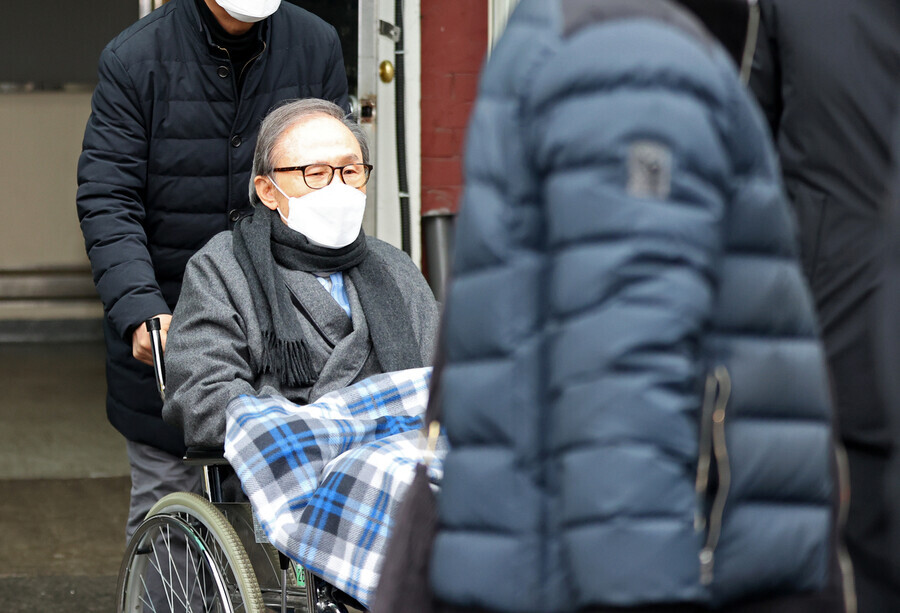hankyoreh
Links to other country sites 다른 나라 사이트 링크
Ex-President Lee’s temporary release jumpstarts speculation about pardon

Former South Korean President Lee Myung-bak, 81, was temporarily released from Anyang Correctional Institution in Gyeonggi Province, where has been serving a 17-year sentence on charges including embezzlement and bribery.
With current President Yoon Suk-yeol actively considering the possibility of a pardon since the campaign trail, and with former members of the People Power Party’s “pro-Lee” wing now serving as key officials in his administration, some observers raising the possibility that the former president will receive a special pardon on the National Liberation Day holiday on Aug. 15.
Yoon previously directed the investigation and indictment against Lee as head of the Seoul Central District Prosecutors’ Office in 2018.
The Suwon District Prosecutors’ Office, under chief prosecutor Hong Seung-wook, announced Tuesday afternoon that it had decided to suspend the execution of Lee’s sentence for three months. The decision was based on “the results of a review by the review committee, which determined that there were ‘risks of substantial harm to the petitioner’s [Lee’s] health from enforcement of the sentence in consideration of his current health condition,’” the office said.
Early that day, the office held a meeting of its review committee for stays of sentence execution to discuss Lee’s temporary release.
On June 2, Lee submitted a request to the Anyang branch of the Suwon District Prosecutors’ Office asking for a stay of enforcement of his sentence, citing health issues.
The Criminal Procedure Act allows for the chief prosecutors of local prosecutors’ offices to make the decision to suspend the enforcement of a sentence based on the opinions of a review committee consisting of internal and external members in cases where a prisoner’s health or life is threatened by continued enforcement or in cases where the person in detention is 70 years of age or older.
Since last week, Lee has been hospitalized at Seoul National University Hospital in Seoul’s Yeongeon neighborhood. He was also admitted to the same hospital one time each in January and February for close examinations related to chronic conditions.
“The decision on when to discharge him is up to the physicians,” attorney Kang Hoon, who represents Lee, told the Hankyoreh.
“He still has half ownership of his home in Nonhyeon, which was put up for public sale. Once he is discharged, he plans to pay rent to live at his Nonhyeon home,” Kang explained.
After seizing Lee’s Seoul home last year, prosecutors disposed of half of the building and land by public sale to collect 5.78 billion won for penalties. Lee has currently paid 4.8 billion won of his 13 billion won in fines.
The stay of sentence execution appears likely to feed the ruling party’s growing calls for a special pardon.
Floor leader Kweon Seong-dong previously said that “precedents suggest an Aug. 15 pardon may be a possibility,” referring to the traditional issuance of presidential pardons on National Liberation Day.
Yoon also alluded to the need for a pardon, questioning whether it was “right in terms of precedent to keep [Lee] incarcerated for 20 years or more.”
But in addition to Lee having spent only two years and six months in prison — compared with the four years and nine months served by ex-President Park Geun-hye before her pardon — the charges applied against him were also more severe, including accepting bribes and other crimes involving misappropriation for personal gain.
Not only that, but it was Yoon himself who directed the investigation and indictment against Lee as director of the Seoul Central District Prosecutors’ Office — and who gave the orders behind the request for a 20-year sentence.
Explaining the reason for the sentencing request, Song Gyeong-ho — the current chief of the Seoul Central District Prosecutors’ Office, who was director of the second special investigation department at the time — stressed the importance of a “stern judicial punishment of the anti-constitutional acts committed by the accused [Lee] in order to firmly establish the foundations of liberal democracy and the rule of law that have been so grievously undermined.”
By Bae Ji-hyun, staff reporter; Joh Yun-yeong, staff reporter
Please direct questions or comments to [english@hani.co.kr]

Editorial・opinion
![[Column] Tariffs on China: Trump was dumb, Biden dumber [Column] Tariffs on China: Trump was dumb, Biden dumber](https://flexible.img.hani.co.kr/flexible/normal/500/300/imgdb/original/2024/0520/191716191153918.jpg) [Column] Tariffs on China: Trump was dumb, Biden dumber
[Column] Tariffs on China: Trump was dumb, Biden dumber![[Column] What if Seoul took reunification by force off the table? [Column] What if Seoul took reunification by force off the table?](https://flexible.img.hani.co.kr/flexible/normal/500/300/imgdb/original/2024/0520/3017161928630494.jpg) [Column] What if Seoul took reunification by force off the table?
[Column] What if Seoul took reunification by force off the table?- [Editorial] Intensifying US-China rivalry means Seoul must address uncertainty with Beijing sooner than later
- [Column] When ‘fairness’ means hate and violence
- [Editorial] Yoon must stop abusing authority to shield himself from investigation
- [Column] US troop withdrawal from Korea could be the Acheson Line all over
- [Column] How to win back readers who’ve turned to YouTube for news
- [Column] Welcome to the president’s pity party
- [Editorial] Korea must respond firmly to Japan’s attempt to usurp Line
- [Editorial] Transfers of prosecutors investigating Korea’s first lady send chilling message
Most viewed articles
- 1Xi, Putin ‘oppose acts of military intimidation’ against N. Korea by US in joint statement
- 2For new generation of Chinese artists, discontent is disobedience
- 3[Editorial] Transfers of prosecutors investigating Korea’s first lady send chilling message
- 4[Column] When ‘fairness’ means hate and violence
- 5[Editorial] Intensifying US-China rivalry means Seoul must address uncertainty with Beijing sooner t
- 6How K-pop broke the internet — and broke into the US market
- 7[Exclusive] Unearthed memo suggests Gwangju Uprising missing may have been cremated
- 8‘Shot, stabbed, piled on a truck’: Mystery of missing dead at Gwangju Prison
- 9Naver to acquire Canada’s Wattpad to fuel its IP ambitions
- 10AI, robots won’t free us from work - they’ll make our jobs worse